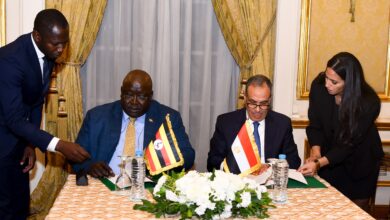
Ashraf AboArafe
Madbouly: Establishing Nile Medical City will create a breakthrough in providing various types of healthcare to patients
Dr. Mostafa Madbouly, Prime Minister, inspected the construction work of Nile Medical City and the development of Nasser Institute Hospital, accompanied by Dr. Khaled Abdel Ghaffar, Deputy Prime Minister for Human Development, Minister of Health and Population, Dr. Ibrahim Saber, Governor of Cairo, Dr. Anwar Ismail, Assistant Minister of Health for National Projects, Dr. Mahmoud Saeed, Director of Nasser Institute Hospital, and Dr. Maha Ibrahim, Head of the Secretariat of Specialized Medical Centers.
Dr. Khaled Abdel Ghaffar stressed that the ministry gives great priority to expanding health projects and new constructions in all governorates, most notably Nasser Institute Hospital for Research and Treatment, by developing it to become the largest medical city in Egypt and the Middle East.
The Deputy Prime Minister added that Nasser Institute Hospital is an attractive environment for doctors from various specialties, due to its scientific and research importance, as it receives large numbers of patients daily, stressing the ministry’s keenness to cooperate with the relevant authorities to provide all medical supplies and consumables, in addition to working to ensure the availability of doctors in various medical specialties on a permanent basis.
In this context, Dr. Khaled Abdel Ghaffar pointed out that Nasser Institute Hospital, which will be transformed into the Nile Medical City, has not witnessed any development over 30 years, until 2015.
The Deputy Prime Minister for Human Development explained that the average frequency of visits to the institute reaches 2 million patients annually, including 384,758 visitors to the outpatient clinics, which number 64 clinics in 28 medical specialties, in addition to 72,800 patients visiting the Oncology Center clinics.
He continued: This is in addition to 55,000 patients in the internal department, receiving 34,104 patients in the emergency department, in addition to providing 25,000 dialysis sessions, 1,078,000 services through laboratories, about 21,000 surgical operations, and more than 32,000 chemotherapy sessions, in addition to providing medical services to more than 31,000 patients in intensive care departments, adding that the institute provided medical tourism services to 1,620 incoming patients during 2023.
Dr. Khaled Abdel Ghaffar also indicated that the current bed capacity of the institute reaches 434 beds, including 105 care beds for adults and children, in addition to 6 incubators for premature babies, 22 operating rooms, including 19 rooms for major operations, 3 rooms for one-day surgeries and cardiac and cerebral catheters, 31 emergency beds, and 50 dialysis machines.
Following that, the Prime Minister listened to a detailed explanation from Dr. Anwar Ismail, Assistant Minister of Health for National Projects, about the works and constructions of the Nile Medical City being built inside Nasser Institute, which began construction in 2022, and will include a new building, a regional center for organ transplantation, a center for research and diagnostic radiology, in addition to an airstrip and a river ambulance point, in addition to an outpatient clinic building and a multi-storey garage, noting that the total completion rate of the project reached 32.1%.
The Assistant Minister explained that the project to develop Nasser Institute to become the Nile Medical City includes developing 3 existing buildings and constructing new buildings, including an extension of the main building, a building for treating cancer patients, and another building for outpatient clinics on an area of 22,800 square meters.
Dr. Anwar Ismail stressed that the Nile Medical City enjoys a strategic location near all important axes, and is close to Cairo University and the metro lines. He said that this city with its large buildings is a big dream that is now coming true, noting that “Nile Medical” is designed to be a smart city, and qualified for the comprehensive health insurance system.
The Assistant Minister also pointed out that all the different places and spaces were exploited to serve the city’s purposes, as parking areas and a surface garage were established, and he pointed out that there is a plot of land belonging to Cairo Governorate that can also be exploited and added to the surface garage, which the governor approved.
Following that, the Prime Minister went to inspect the doctors’ residence building, and models of the rooms built in it, and he also inspected the construction work of the Nasser Institute Hospital extension building that was connected by a bridge to the old building; Dr. Anwar Ismail reviewed the current implementation status of the construction works, and explained that the implementation rate of the female doctors’ housing is 99.25%, and the implementation rate of the doctors’ housing is 99.33%, in addition to the future extension building, whose implementation rate is 29.16%, and the clinics building has currently reached 53.6%, the garage building 73.5%, and the oncology building 11.06%.
The Assistant Minister of Health for National Projects explained that the design and implementation are being carried out in a global manner and standards, stressing that all new buildings and facilities have been approved by the Accreditation and Quality Authority, and have been implemented according to the standards of the comprehensive health insurance system. He said that the Nile Medical City project has become a huge national project by all standards.
Dr. Mostafa Madbouly also inspected one of the wings affiliated with the Ministry of Health at Nasser Institute Hospital, as well as the Palestinian wing, where he was keen to visit the patient rooms, intensive care rooms for children and adults, and cardiac care in the two wings.
At the end of his tour, the Prime Minister stressed the importance of this huge medical facility in serving patients from citizens who flock to it from all parts of the republic, noting that the establishment of the Nile Medical City on the Nile Corniche and in this distinguished strategic location will create a breakthrough in providing various types of health care to patients, which is what the state is keen on working to raise the level of quality of health care provided to citizens.




